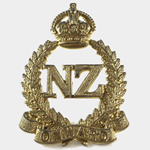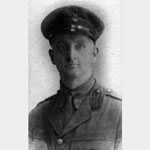Commemorated: | |||
| 1. Document: | New Zealand WW1 Masonic List | N.Z. | |
Awards & Titles: | British War Medal Victory Medal | ||
Early Life :
Mrs W.W. Ross (mother), 3 Dublin Street, Wanganui, New Zealand.Service Life:
Campaigns:
- The First World War 1914-1918, World-wide.
| Unit / Ship / Est.: New Zealand Expeditionary Force |
| Action : War Survivor |
Although many perished in times of national conflict and in the service of their country, many more survived including those interned as Prisoners of War. Stories of those who did survive are included as part of this site, especially those with high gallantry awards, those included against an external rolls of honour and those who had a distinguished career in wartime and military leaderhip.
Detail :
8/1133 Captain Reverend John Wallace Ross, Chaplaincy Department, New Zealand Expeditionary Force.
Embarked on HMNZT 3-12 on the 16th October, 1914 and served through the entire war. Discharged from service on 28th April, 1920 having spent 5 years 247 on active duty, the majority of this overseas.
Anne Mitchell writes, "As I have resided in New Zealand for half a century, I was very curious to know a little more about this Kiwi Presbyterian who had been attached to the Edinburgh Regiment. "First, I was able to find his record and a photograph from the archives of the Presbyterian Church of Aotearoa New Zealand. "Then I chanced upon mention of him when reading the fascinating memoirs of Andy Steedman who was the father-in-law of a friend in Edinburgh. Steedman was a Fifer who had migrated to New Zealand a few years before the First World War and joined the New Zealand 1st Expeditionary Force at the outbreak of hostilities. Though Ross was, evidently, not popular with the Kiwis he was much valued by the Scots Regiment and ultimately returned to the land of his forebears after the war. "From the Knox College, Dunedin Register: 'The Rev. Capt. John Wallace Ross was the son of the Rev. John Ross, who was born in 1829 in Caithness, Scotland. Capt. Ross was born in Turakina, New Zealand in 1886 and was in residence at Knox College Theological Hall, Dunedin, New Zealand from 1910 to 1914. He became a Presbyterian minister and was ordained as a chaplain to the forces from 1914 to 1919. He resigned from the Presbyterian Church of New Zealand in 1920, and emigrated to Scotland. He became a minister of the Church of Scotland at Burnmouth from 1922 to 1929 and Denholm from 1929 to 1953'.
"From Andy Steedman’s Recollections: Sailing from Wellington to Suez with the 1st New Zealand Expeditionary Force in 1914. 'The padre on board was called Ross, a red-headed type, not too popular with the troops but he seemed to think a lot of himself. So it got about that the Captain went down to the padre’s cabin and told him that if he caught him near his cabin or on the bridge he would throw him over the side. The conditions on board weren’t the best and tempers were strained at times.' "On board, in very cramped stabling, they had a large cargo of dearly beloved horses belonging to the troops who were more worried about the treatment of their horses than about their own welfare. Ross was, of course, quite a young man and fresh out of College! "On 3rd December 1915, The Scotsman published an interview with Lt. Col. JTR Wilson, commandant of the 5th Royal Scots, in which he commends the work of the padres in Gallipoli, and makes mention of the Rev. J W Ross. He said, 'May I give a word of praise to the padres of all creeds. The splendid young athlete lent us by the New Zealand forces as Presbyterian chaplain left the Battalion his debtor for brave and unwearied encouragements and I, for one, feel honoured to have had his friendship. Services could not be held in the trenches, but when possible on the sea shore rest camp they were arranged for all. These devotions had an impressiveness not excelled in the world’s cathedrals, whether the Presbyterian eloquently preaching to an audience intent and devout, while the sun set in glory behind Imbros and Samothrace; or whether morning Holy Communion, when the Catholics knelt on the pebbly beach in lowly adoration of the mystic Presence on the simple altar of empty boxes. From one assembly perhaps would come O, God of Bethel, and from the other Sweet Sacrament Divine. I fear the singing was not very good in either case, but at least it was our best, as was the universal ending of God save the King.' "The full text of this interview is included among the Appendices. "One of the youngsters who sailed with John from the UK on 10th May bound for Gallipoli was William Dyce an Orcadian. He was only eighteen and had been in Gallipoli for less than a month when he was shot by a sniper while fetching water for his comrades in the trenches, and died instantly. The Orcadian of the time tells us that 'Mr Ross, the Presbyterian chaplain, conducted the ceremony, and his funeral was attended by the Colonel and all his company officers.' This brings home to us the stress of the duties falling to these chaplains at the battlefield. "The Rev. J Ross is still remembered in Denholm, which lies deep in the border country between Jedburgh and Hawick, as a very tall white haired kindly man who retired in the early 1950s.
See more at Scotland at War - Chapter 3.
He is commemorated for his service on the Auckland Museum Online Cenotaph.
Masonic :
| Type | Lodge Name and No. | Province/District : |
|---|---|---|
| Mother : | Anglo-Colonial No. 3175 E.C. | London |
Initiated | Passed | Raised |
21st May 1917 | 4th July 1917 | 24th September 1917 |
Initiated into the Anglo-Colonial Lodge No. 3175 in 1917 when John was recorded as a 30 year old Chaplain, resident at Codford. His war service is shown in 1920-21.
Source :
The project globally acknowledges the following as sources of information for research across the whole database:
- The Commonwealth War Graves Commission
- The (UK) National Archives
- Ancestry.co.uk - Genealogy, Family Trees & Family History online
- ugle.org.uk - The records of the United Grand Lodge of England including the Library and Museum of Freemasonry
Additional Source:
- Founder Researchers : Paul Masters & Mike McCarthy
- Researcher : Bruce Littley

